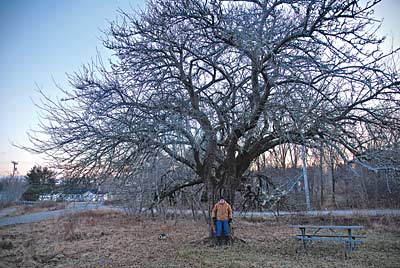 |
| Rudy Kelly, an ardent heirloom apple tree sleuth and volunteer for MOFGA’s Maine Heritage Orchard, standing by an ancient tree he discovered that he calls “Jake 1829.” Photo by Abbey Verrier |
By Abbey Verrier and Angus Deighan
A few years ago, Rudy Kelly and his girlfriend, Phoebe Barnes, were driving to the Common Ground Country Fair when they got a call from Kelly’s Uncle Tommy. It was important, so they turned around and headed back to Mount Desert Island. When Kelly’s father was a child, the family portrait was always taken in front of an apple tree that grew by the house. The house was now gone, and the land sold. Tommy was the only surviving relative who knew were to find that tree, and he was dying. The old man, “riddled with cancer,” led Kelly through the woods, undeterred by the new “Posted” signs. Eventually they came upon the old foundation, and next to it, the tree.
“It was just like the picture,” says Kelly. “It really hasn’t changed. It’s old, needs a little work.”
Like his father, Kelly was born on MDI. His mother went into labor during the Great Fire of 1947. The flames that would ultimately consume 17,000 acres of MDI made it impossible to travel, so Kelly was born at home. He got his first skiff when he was 9 years old. He and his friends made and set out their own lobster traps for extra cash. As they got older, they would have clam bakes on the small islands off the coast and would sneak into the dock workshop for a game of pool. In the autumn he could often be found lying under an old apple tree at the end of his grandmother’s driveway, eating apples until he felt sick. To this day, he remembers them as the tastiest apples he’s ever had.
Like so many in his generation, his childhood group of friends was broken up by the draft for Vietnam. Although they all made it through, they did not all return to MDI. Kelly spent most of his adult life out West, working as a cowboy, and then as a policeman near the Lakota Pine Ridge Reservation in South Dakota, not long after the Wounded Knee Incident of 1973 – a dangerous and violent time. After working with Native Americans and becoming life-long friends with many, Kelly is still shocked that our nation as a whole has chosen to ignore the problems of poverty, substance abuse and suicide that haunt Pine Ridge and many other reservations.
“President Clinton apologized,” he says. “There’s no one that can apologize for what you did wrong or what your grandfather did wrong. I’m not going to apologize for what my great-grandfather did or didn’t do. It has no meaning. Let’s put some teeth into it and let’s fix the problem. This is a bad thing. We need to do something.”
When Kelly was out West, he discovered that he loved to run. He retired early and moved home to Maine, where he continued to pursue his passion for running and, of course, apples. He’s clearing land in Tremont, by himself, where he will build a house and start an apple orchard. He’s already planted three or four trees – one he grafted from the old family portrait tree that Tommy showed him before he died.
Sadly, the tree at the end of his grandmother’s driveway was cut down by the new owners, so he will never be able to propagate it. Now he searches for that variety in John Bunker’s apple display at every Common Ground Country Fair. Kelly admits that the memory of its unrivaled flavor could be a product of childhood nostalgia. Still, an hour-long drive home from the dentist in Blue Hill can turn into a three-hour stop-and-go sampling of roadside apples. He still hopes that the next apple he bites into will be the one.
Regarding MOFGA’s Maine Heritage Orchard, Kelly says he “was astonished to see so many volunteers of all ages working so hard, ‘specially the younger people, everyone taking time out of their own lives for this project – helping transform this piece of property from an eyesore, a wasteland, into something special and beautiful like an apple orchard, something people can enjoy for hundreds of years. Oh yes, I definitely wanted in on this. These were my kind of people. I encourage everyone who reads this to come out this spring and volunteer a little of their time to help make this special and important project reality. I know I’ll be there.”
Abbey Verrier is the Maine Heritage Orchard research assistant. Angus Deighan has spent many hours planting and tending the orchard.
